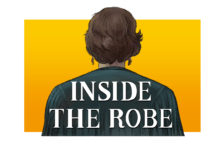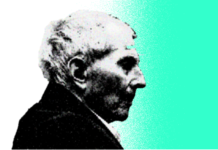Katherine Mader spent two decades as a judge in Los Angeles Criminal Court, before retiring early in 2020. Before that she was the LAPD’s first Inspector General, prosecuted two murder-for-hire trials and served as a defense attorney who convinced a jury to spare the life of the Hillside Strangler. In August of this year, Judge Mader published Inside the Robe: A Judge’s Candid Tale of Criminal Justice in America, which best selling author Michael Connelly called: “a perfect book: engrossing and telling at the same time.” The Judge has granted Crime Story permission to excerpt the entirety of her book over the coming months. You can find previous installments of Inside the Robe here. This is Part 33.
March 4
The foreman in the narcotics conspiracy trial is a clean-cut Caucasian product engineer. The only thing missing from the classic engineering look is a plastic pocket pen protector. Usually, the jury picks someone with prior jury experience as the foreperson because that person needs to oversee the deliberations. This foreperson has no prior experience.
The prosecutor gave a persuasive rebuttal argument. As he said, “This defendant must be the unluckiest guy in the world. Here he is, alone for two hours in a stash pad with thousands of dollars of drugs. The narcotics expert testified that no one would be allowed to have access to drugs of this amount unless they were part of the trafficking organization because there is too much potential for theft. According to the expert, the person in the house is held responsible for the narcotics. The defendant is not only alone with the drugs, but he also has the keys to the house and the garage door opener. Most of the drugs are found inside the garage. He is surely “one unlucky guy.”
This morning, I greeted new jurors in the jury assembly room. It’s one of the largest spaces in the courthouse and usually contains a long line of potential jurors standing in front of a glass window trying to cajole the clerk behind it to excuse them from service. The rest of the room contains about 100 school-type chairs where jurors leaf through old golf and fishing magazines and gaze at their cell phones while waiting to be sent to a courtroom. Trials can start either in the morning or afternoon, even at 4:00 p.m. Often a juror waits all day for a call that never comes.
Each judge’s turn to greet the jurors comes up every couple of months. The jurors have to show up at 8:00 a.m., and they are never happy. I usually say, “Los Angeles is the new Ellis Island. People from all corners of the world, all income levels, and all racial groups come together in the jury room. Even though you may not be happy at first, I feel confident that you will be happy after you have served. You will have a much better understanding of how our criminal justice system works. It’s also empowering to work with fellow jurors and make an important decision about a member of the community.” Referring to “Ellis Island” may be ludicrous. The mishmash of nationalities that passed through Ellis Island occurred between 1892 and 1954. Most jurors weren’t even alive during that period, which ended over sixty years ago. I say it anyway because it makes me feel warm. I like to think about Ellis Island because my parents arrived from Europe during that time period, and I am grateful that America welcomed them.
Once they are on a jury, I always feel touched at the seriousness with which jurors take their responsibilities. Jurors who have done everything to get out of jury duty, including consulting the internet for canned excuses, often change their attitude completely once they get the opportunity to serve.
Next week, I have been subpoenaed to testify for a fellow judge accused by the Commission on Judicial Performance (CJP) with being rude to potential jurors during jury selection. If a complaint is received from someone about a judge’s behavior―and that happens around 1400 times per year―the CJP may assign an investigator, decide that a judge deserves discipline, or hold a hearing about the misconduct. Judges, including me, are conscious that the CJP is hovering.
Members of the CJP, dominated by public members, appear to view themselves as “consumer protectors.” Surely bad judges should be punished. But there’s no hue and cry to ensure that judges are not unjustly accused.
My colleague is accused of speaking rudely to several jurors who were trying to avoid jury service in a month-long, four-defendant gang murder trial. Fellow judges worry about the precedent this would set. It’s hard to get jurors to serve in contentious trials. While we all try to be polite to prospective jurors who may be lying to us about their availability or their ability to speak English, we also can make mistakes about what we say. Not every oral mishap should be cause for discipline. Shouldn’t warnings, especially to otherwise fine judges, be sufficient?
March 7
The formal disciplinary hearing for my judge friend begins today. We do need an entity like the CJP. Judges need to be held to high ethical standards. Who wants to be before a judge who belittles litigants, takes gifts from lawyers, or sexually harasses staff? The public needs to have confidence in the judiciary. We’ve had a judge “disappear” from his courtroom for months at a time, claiming he was ill, until he was found attending medical school in the Caribbean. Another judge called a defendant’s wife into his chambers and threatened to punish her husband more harshly unless she engaged in a sexual relationship with him. That judge went to prison, along with losing his judgeship. No one disagrees with those examples. The problem arises when the CJP seeks to discipline judges for minor offenses. Most judges are terrified of the CJP. The CJP is subject to little oversight but can wreck a judge’s career. Being selected to be a member of the CJP is a political process best suited for well-connected lay people or judges who want to advance in court leadership. Accused judges are encouraged to accept discipline, apologize profusely, and promise the misconduct will never happen again. That is all fine, but what if the judge is not guilty of the charges?
Disclosure: I had one tangle with the CJP about seven years ago. My issue was very minor. I received a motion from a “frequent flyer” to review a supposed legal error in the trial that I conducted. A frequent flyer is a prisoner who constantly files motions after they’ve been sentenced. A new court rule decreed that I should not rule on a motion challenging something that I did as the trial judge.
Yes, I erred. I wasn’t aware of the new rule. I read the prisoner’s motion, evaluated it, and denied it. The prisoner then complained to the CJP that I violated the new court rule by judging a matter involving my own ruling. The CJP wanted to give me a “stinger letter,” the lowest form of discipline. A stinger letter warns the judge, “Don’t do it again.”
I wanted a full hearing. I told my attorney, “This motion was sent to me by the supervisor in my courthouse to handle. Every judge in the county handled motions from prisoners the same way for years. We all needed to get used to the new court rule that was not widely publicized. Why should I be singled out for discipline just because a prisoner wrote a letter to the CJP?”
My attorney strongly urged me, “Just accept the discipline. It won’t matter in the end.” To this day, I regret that I felt intimidated and meekly accepted punishment. There is no way my discipline can be undone. It is ironic that criminals who have been convicted of minor offenses can have their records expunged. Judges are unable to have discipline expunged, no matter how many years have passed since the “offense.”
Buzz. Buzz. The jury in my trial has been buzzing all day with questions. At 10:30 this morning, after only about two hours of deliberations, the jury told me they were hung and could not make a unanimous decision. They are having problems with the concept of conspiracy. It’s true that the defendant was not seen with the meth, didn’t have meth on his person, and was never involved in a sale of meth. The jury is divided 10-2. I am not allowed to ask in what direction they are leaning unless I declare the jury hopelessly hung and grant a mistrial.
At the end of the day, I granted a mistrial. The jury remained hung 10-2. The majority was in favor of “Not Guilty.” This trial was a good example of the phrase “If you’re guilty, demand a jury trial.” According to jurors whom the attorneys interviewed after the trial, “We thought the defendant could just have been a helpful father looking after his son’s house.”
We call this the CSI effect. Jurors watch crime shows and want all possible scientific tests conducted and all loose ends neatly tied up. The world of crime isn’t like that. Not every case has DNA testing, video cameras, and specialized scientific tests. The jurors are expected to use their common sense. As the prosecutor argued, his duty is to prove the case beyond a reasonable doubt, not beyond all possible doubt. The prosecutor needs to decide whether he intends to re-try the case. I learned later that the prosecutor dropped all charges against the defendant.



